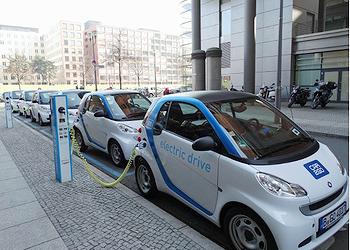
WASHINGTON, DC, August 3, 2018 (ENS) – The Trump administration proposed Thursday to freeze national automobile fuel economy and greenhouse gas emissions standards for model year 2021-2026 passenger cars and light trucks. Opponents, including 19 states’ attorneys general, have already filed a lawsuit to block the proposal.
On August 2, the U.S. Department of Transportation’s National Highway Traffic Safety Administration (NHTSA) and the U.S. Environmental Protection Agency (EPA) released a notice of proposed rulemaking, to “correct the national automobile fuel economy and greenhouse gas emissions standards,” the agencies said in a joint statement.

But this appears to be a solution in search of a problem. At present, the auto industry is on track to meet or exceed the clean car standards at issue.
Still, the two agencies are seeking public comment on a wide range of regulatory options. Their preferred alternative locks in Model Year 2020 standards through 2026, providing a time-out from further increases.
The agencies’ preferred alternative reflects a balance of safety, economics, technology, fuel conservation, and pollution reduction.
Trump administration officials expect that if the rule is adopted it will “…prevent thousands of on-road fatalities and injuries as compared to the standards set forth in the 2012 final rule.”
“There are compelling reasons for a new rulemaking on fuel economy standards for 2021-2026,” said Transportation Secretary Elaine Chao, wife of Senate Majority Leader Mitch McConnell.
“More realistic standards will promote a healthy economy by bringing newer, safer, cleaner and more fuel-efficient vehicles to U.S. roads and we look forward to receiving input from the public,” said Chao.
“We are delivering on President Trump’s promise to the American public that his administration would address and fix the current fuel economy and greenhouse gas emissions standards,” said EPA Acting Administrator Andrew Wheeler. “More realistic standards can save lives while continuing to improve the environment. We value the public’s input as we engage in this process in an open, transparent manner.”
In 2010, the EPA and the NHTSA, the California Air Resources Board (CARB) and automakers established a national program harmonizing greenhouse gas emission standards and fuel efficiency (CAFE) standards. In 2012 the agencies extended the program to model years 2017-2025 vehicles.
As part of the program, California and the federal agencies agreed to a mid-term evaluation to determine if the standards for model years 2022-2025 vehicles should be maintained or revised. In January 2017, the EPA affirmed the existing standards were appropriate and would not be changed. CARB confirmed this opinion in March 2017.
On April 13, 2018, however, the Trump administration took the first step toward dismantling the national program when the EPA alleged the federal greenhouse gas standards for model year 2022-2025 vehicles were no longer appropriate.
Leading a coalition of 17 states and the District of Columbia, Governor Brown, Attorney General Becerra, and CARB filed a lawsuit against the EPA on May 1 over this action.
Instead of adopting maximum feasible standards to increase vehicle fuel efficiency, as federal law requires, rather than addressing the pressing threat of climate change as the Clean Air Act mandates, the administration is moving to freeze the standards at the 2020 level through model year 2026, the California officials argue.

They are also riled up because the Trump administration is proposing to withdraw the waiver granted to California more than five years ago for California’s own greenhouse gas emissions standards and its successful zero-emission vehicle programs.
This is an unprecedented and unlawful action that the California officials say, “…flies in the face of congressional intent and would aggravate the harms to consumers, public health, the economy and the environment caused by the weakening of the federal standards.”
The administration proposal also would block the many other states that use California standards from moving forward.
But Republican members of Congress support the Trump proposal. South Dakota Senator John Thune, who chairs the Senate Committee on Commerce, Science, and Transportation, said, “The SAFE Vehicles proposal offers the public an important opportunity to consider new information about the safety realities of smaller and lighter vehicles in collisions as part of a more informed conversation about achievable fuel economy standards.”
General Motors said in a statement, “We are encouraged the proposal includes provisions that would recognize the environmental benefits of new technology developments such as the increased use of electric vehicles, autonomous and related technologies.”
The public will have 60 days to provide feedback once published at the Federal Register. Details can be found at NHTSA’s website.
Copyright Environment News Service (ENS) 2018. All rights reserved.
© 2018, Environment News Service. All rights reserved. Content may be quoted only with proper attribution and a direct link to the original article. Full reproduction is prohibited.
